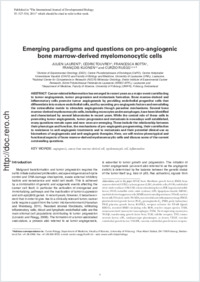Emerging paradigms and questions on pro-angiogenic bone marrow-derived myelomonocytic cells
- Laurent, Julien Division of Experimental Oncology, Centre Pluridiscipliniaire d'Oncologie, Centre Hospitalier Universitaire Vaudois - Faculty of Biology and Medicine, University of Lausanne, Switzerland
- Touvrey, Cédric Division of Experimental Oncology, Centre Pluridiscipliniaire d'Oncologie, Centre Hospitalier Universitaire Vaudois - Faculty of Biology and Medicine, University of Lausanne, Switzerland
- Botta, Francesca Division of Experimental Oncology, Centre Pluridiscipliniaire d'Oncologie, Centre Hospitalier Universitaire Vaudois - Faculty of Biology and Medicine, University of Lausanne, Switzerland
- Kuonen, François Division of Experimental Oncology, Centre Pluridiscipliniaire d'Oncologie, Centre Hospitalier Universitaire Vaudois - Faculty of Biology and Medicine, University of Lausanne, Switzerland - National Center for Competence in Research - Molecular Oncology,ISREC, Ecole Polytechnique Fédérale de Lausanne, Switzerland
- Rüegg, Curzio Division of Experimental Oncology, Centre Pluridiscipliniaire d'Oncologie, Centre Hospitalier Universitaire Vaudois - Faculty of Biology and Medicine, University of Lausanne, Switzerland - National Center for Competence in Research - Molecular Oncology,ISREC, Ecole Polytechnique Fédérale de Lausanne, Switzerland - Department of Medicine, Faculty of Science, University of Fribourg, Fribourg, Switzerland
-
11.07.2011
Published in:
- The International Journal of Developmental Biology. - 2011, vol. 55, p. 527-534
English
Cancer-related inflammation has emerged in recent years as a major event contributing to tumor angiogenesis, tumor progression and metastasis formation. Bone marrow-derived and inflammatory cells promote tumor angiogenesis by providing endothelial progenitor cells that differentiate into mature endothelial cells, and by secreting pro-angiogenic factors and remodeling the extracellular matrix to stimulate angiogenesis though paracrine mechanisms. Several bone marrow-derived myelonomocytic cells, including monocytes and macrophages, have been identified and characterized by several laboratories in recent years. While the central role of these cells in promoting tumor angiogenesis, tumor progression and metastasis is nowadays well established, many questions remain open and new ones are emerging. These include the relationship between their phenotype and function, the mechanisms of pro-angiogenic programming, their contribution to resistance to anti- angiogenic treatments and to metastasis and their potential clinical use as biomarkers of angiogenesis and anti-angiogenic therapies. Here, we will review phenotypical and functional aspects of bone marrow-derived myelonomocytic cells and discuss some of the current outstanding questions.
- Faculty
- Faculté des sciences et de médecine
- Department
- Médecine 3ème année
- Language
-
- English
- Classification
- Biological sciences
- License
- License undefined
- Identifiers
-
- RERO DOC 28476
- DOI 10.1387/ijdb.103228jl
- Persistent URL
- https://folia.unifr.ch/unifr/documents/302114
Statistics
Document views: 115
File downloads:
- rue_epq.pdf: 155
